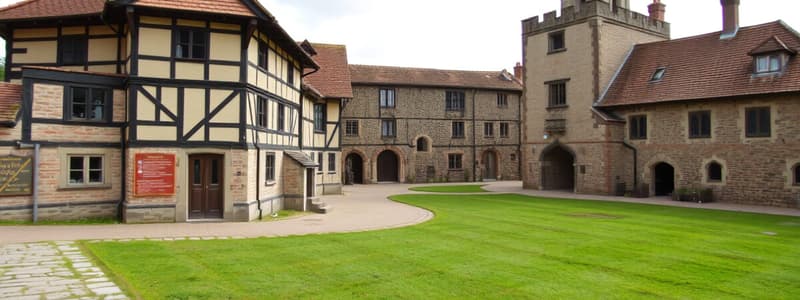Podcast
Questions and Answers
What language family do the ultimate origins of English belong to?
What language family do the ultimate origins of English belong to?
- Latin
- West Germanic
- Celtic
- Indo-European (correct)
In which year did the Romans invade Britain?
In which year did the Romans invade Britain?
43
The Goths were speakers of a Germanic language.
The Goths were speakers of a Germanic language.
True (A)
The __________ introduced new religious words borrowed from Latin and Greek to the Anglo-Saxons.
The __________ introduced new religious words borrowed from Latin and Greek to the Anglo-Saxons.
Who was the first English king to convert to Christianity?
Who was the first English king to convert to Christianity?
Which of the following languages influenced Old English?
Which of the following languages influenced Old English?
What is the approximate date of the earliest manuscript records of Old English?
What is the approximate date of the earliest manuscript records of Old English?
The Norman invasion in 1066 led to Latin becoming the primary language of the courts in England.
The Norman invasion in 1066 led to Latin becoming the primary language of the courts in England.
What is the name of the only surviving manuscript of the Old English epic poem?
What is the name of the only surviving manuscript of the Old English epic poem?
King Alfred of Wessex translated works into __________ during his reign.
King Alfred of Wessex translated works into __________ during his reign.
Flashcards are hidden until you start studying
Study Notes
Prehistory of English
- Origins trace back to Indo-European, a family of languages across Europe and parts of Asia.
- Historical context begins with the Roman invasion of Britain in 43 A.D., lasting approximately 400 years.
Early Development of English
- 410 A.D.: Goths sack Rome, initiating the arrival of Germanic tribes in Britain.
- Early 5th century: Romans withdraw; Picts and Scots attack the Britons, leading to settlement by Angles, Saxons, and other Germanic tribes.
- 5th-6th centuries: Emergence of West Germanic dialects dominates Britain, pushing Celtic languages to remote areas.
Old English Period (500-1100)
- The Anglo-Saxon conquest led to the formation of Old English, influenced predominantly by Anglo-Saxon dialects.
- Late 6th century: King Ethelbert of Kent becomes the first English king to be baptized, marking the introduction of Christianity.
- 7th century: Establishment of various kingdoms, including Wessex; missionaries introduce Latin and Greek terms into English.
- 673: Birth of Venerable Bede, author of "The Ecclesiastical History of the English People," vital for understanding Anglo-Saxon history.
- 700: First manuscript records of Old English appear.
- Late 8th century: Scandinavian settlers begin to influence English through settlement in Britain and Ireland.
- Early 9th century: Egbert of Wessex unites several kingdoms, establishing early England.
- Mid 9th century: Danish raids result in occupation of Northumbria, introducing Old Norse influences.
- Late 9th century: King Alfred the Great's victories against Vikings reinforce national identity and promote English writing.
- 10th century: Peaceful coexistence leads to the incorporation of many Old Norse loanwords into English, including everyday terms like "sister" and "skin."
- Circa 1000: The epic poem "Beowulf," a significant work of Old English literature, is composed.
- Early 11th century: Danish incursions continue as Anglo-Saxon culture flourishes under King Canute's rule.
- 1066: The Norman Invasion marks a pivotal linguistic shift; French becomes the dominant language of the ruling class while English remains spoken by the majority.
Middle English Period (1100-1500)
- Transition characterized by the decline of inflectional endings in English and an expansion of vocabulary influenced by Old French and Latin.
- The structure of English evolves significantly, leading to increased accessibility to the language among common people.
Studying That Suits You
Use AI to generate personalized quizzes and flashcards to suit your learning preferences.




